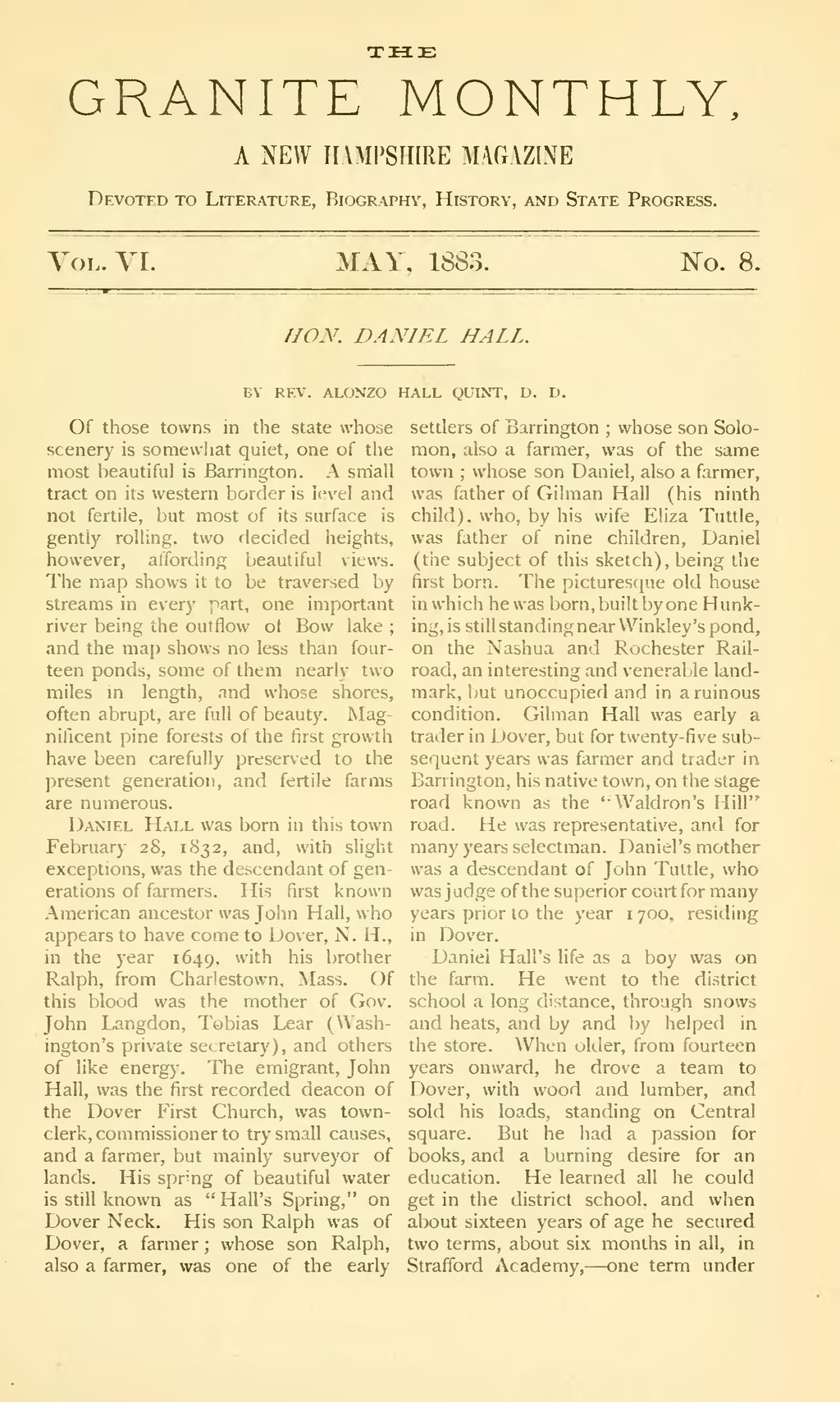THE
��GRANITE MONTHLY,
A NEW HAMPSHIRE MAGAZINE
Devoted to Literature, Biography, History, and State Progress.
��Vol. VI.
��MAY, 1883.
��]STo. 8.
��HON. DANIEL HALL.
��BY REV. ALONZO HALL QUINT, D. D.
��Of those towns in the state whose scenery is somewhat quiet, one of the most beautiful is Barrington. A small tract on its western border is level and not fertile, but most of its surface is gently rolling, two decided heights, however, affording beautiful views. The map shows it to be traversed by streams in every part, one important river being the outflow of Bow lake ; and the map shows no less than four- teen oonds, some of them nearlv two miles in length, and whose shores, often abrupt, are full of beauty. Mag- nificent pine forests of the first growth have been carefully preserved to the present generation, and fertile farms are numerous.
Daniel Hall was born in this town February 28, 1832, and, with slight exceptions, was the descendant of gen- erations of farmers. His first known American ancestor was John Hall, who appears to have come to Dover, N. H., in the year 1649, w *th his brother Ralph, from Charlestown, Mass. Of this blood was the mother of Gov. John Langdon, Tobias Lear (Wash- ington's private secretary), and others of like energy. The emigrant, John Hall, was the first recorded deacon of the Dover First Church, was town- clerk, commissioner to try small causes, and a farmer, but mainly surveyor of lands. His sprmg of beautiful water is still known as '"'Hall's Spring," on Dover Neck. His son Ralph was of Dover, a farmer ; whose son Ralph, also a farmer, was one of the early
��settlers of Barrington ; whose son Solo- mon, also a farmer, was of the same town ; whose son Daniel, also a farmer, was father of Oilman Hall (his ninth child), who, by his wife Eliza Tuttle, was father of nine children, Daniel (the subject of this sketch), being the first born. The picturesque old house in which he was born, built by one Hunk- ing,is stillstandingnearVVinkley'spond, on the Nashua and Rochester Rail- road, an interesting and venerable land- mark, but unoccupied and in a ruinous condition. Gilman Hall was early a trader in Dover, but for twenty-five sub- sequent years was farmer and trader in Barrington, his native town, on the stage road known as the '•'Waldron's Hill" road. He was representative, and for many years selectman. Daniel's mother was a descendant of John Tuttle, who was judge of the superior court for many years prior to the year 1 700, residing in Dover.
Daniel Hall's life as a boy was on the farm. He went to the district school a long distance, through snows and heats, and by and by helped in the store. When older, from fourteen years onward, he drove a team to Dover, with wood and lumber, and sold his loads, standing on Central square. But he had a passion for books, and a burning desire for an education. He learned all he could get in the district school, and when about sixteen years of age he secured two terms, about six months in all, in Strafford Academy, — one term under
�� �
